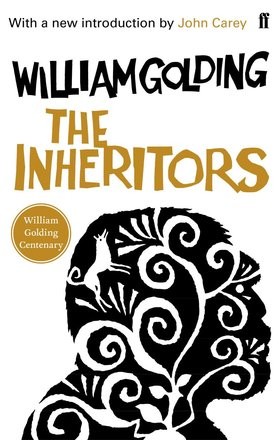This year marks the centenary of William Golding’s birth, a timely reminder of his enduring significance in English literature. To commemorate this milestone, Faber & Faber, his lifelong publisher, has reissued Lord of the Flies and The Inheritors. This act of re-publication itself speaks volumes about Golding’s continued relevance and the reasons why William Golding was praised throughout his career and beyond. While some might express a desire for a more comprehensive reissue of his works, the focus on these two novels provides an excellent opportunity to delve into the qualities that cemented Golding’s reputation as one of the most important post-war English novelists, as Gabriel Josipovici asserted, placing him alongside Muriel Spark.

The cover of the reissued edition of “The Inheritors”, highlighting William Golding’s literary significance.
A Nobel Laureate and Literary Innovator: Understanding the Praise for Golding
William Golding’s praise is not merely a matter of critical opinion; it is substantiated by numerous accolades, most notably the Nobel Prize in Literature in 1983. This prestigious award recognized his novels “which illuminate the human condition in the world of today with the lucidity of realism and the diversity of myth.” This citation encapsulates key aspects of why William Golding was praised. His work delves into the complexities of human nature, often exploring the darker impulses and the fragility of civilization. Lord of the Flies, his most famous work, is a stark allegory of societal breakdown, but his entire oeuvre showcases a consistent engagement with profound philosophical and moral questions. Beyond the Nobel Prize, Golding’s novels have consistently garnered critical acclaim for their innovative style, challenging themes, and masterful use of language.
“The Inheritors”: A Testament to Golding’s Literary Prowess
The Inheritors, first published in 1955 and considered by Golding himself to be his finest work, offers a particularly compelling insight into why William Golding was praised. This novel is not just a story; it’s a linguistic and conceptual experiment that pushes the boundaries of narrative perspective. It immerses readers in the world of Neanderthals, forcing us to deconstruct our own modes of thought and perception. The book’s brilliance lies in its construction from language itself. Unlike novels where style is applied to a pre-existing narrative, The Inheritors emerges organically from its unique linguistic framework, making it a truly sui generis work.
To understand the Neanderthal perspective, Golding employs a language that mirrors their limited cognitive abilities. We are privy to their sensory-dominated world, where experience is primarily external. Their lack of introspection and abstract thought is emphasized through detailed descriptions, highlighting what is not present in their consciousness. They rely heavily on senses, particularly smell, and their understanding of the world is concrete and immediate. Concepts like memory, ideas, and even telepathy are conflated into “pictures” in their minds, suggesting an evolutionary divergence that resulted in both gains and losses in cognitive capacity.
Evolution becomes a central, albeit unseen, character in The Inheritors. The Neanderthals’ daily struggles for survival – finding food, navigating their environment – are amplified by the encroaching presence of “new people,” Homo sapiens. Crucially, we witness these new humans through the limited understanding of Lok and his fellow Neanderthals. This narrative technique, reminiscent of novels narrated by children, demands active interpretation from the reader. Golding masterfully conveys a wealth of information while maintaining the integrity of the Neanderthal perspective. For example, their refusal to kill animals, viewing all life forms as equal (“snail people”), reveals a profound difference in their worldview compared to the more pragmatic and hierarchical Homo sapiens.
Pathos and the Human Condition: The Enduring Appeal of Golding
The novel evokes a deep sense of pathos as we witness the inevitable displacement of the Neanderthals by Homo sapiens. Their struggles, seen through their limited understanding, become all the more poignant in the face of the superior intellect and adaptability of the newcomers. The Homo sapiens possess better tools, communication, and planning abilities, symbolized by their capacity for “leisure and incessant wakefulness,” leading to innovation and societal advancement. The Neanderthals’ occasional glimpses into potential advancements – storing food, carrying water – are fleeting and ultimately unattainable, underscoring their vulnerability.
To approach The Inheritors as a conventional novel would be to miss its profound achievement. Its strength lies in its creation of a world devoid of thought as we understand it, a world rendered complete and convincing through language. While the narrative thread may occasionally be challenging to follow due to the Neanderthal’s fragmented and sensory-based experience, Golding’s meticulous construction of this world is undeniable. Unlike works that rely on linguistic obscurity, The Inheritors achieves its effect through a carefully controlled and perspective-driven use of language.
The reissued edition, featuring an introduction by John Carey, further contextualizes the novel within Golding’s life and work, highlighting his characteristic insecurity even when producing masterpieces. The fact that Charles Monteith, Golding’s editor, published The Inheritors despite Golding’s own doubts speaks to the inherent power and originality of the work.
In conclusion, why William Golding was praised is multifaceted. It stems from his unflinching exploration of the human condition, his innovative narrative techniques, and his profound engagement with moral and philosophical themes. The Inheritors, in its linguistic and conceptual brilliance, stands as a powerful testament to Golding’s literary genius and continues to resonate with readers today, solidifying his place as a truly praised and significant figure in modern literature.